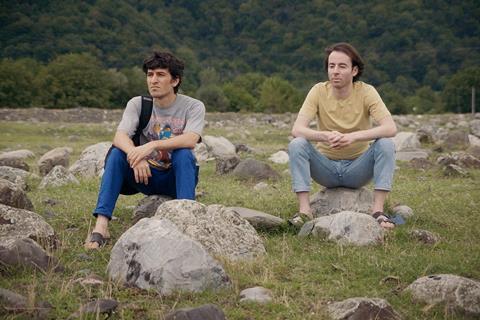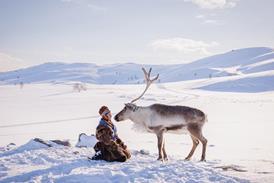Filmmaker Déni Oumar Pitsaev visits the picturesque Pankissi valley in search of his roots

Dir: Déni Oumar Pitsaev. France/Belgium. 2025. 110mins
Chechen filmmaker Déni Oumar Pitsaev directs his own quest to understand his roots, come to terms with his childhood traumas and figure out his sense of belonging in the affecting documentary Imago. More specifically, the film looks at Pitsaev’s summertime visit to the idyllic Pankissi valley in the Georgian Caucasus, where many Chechens have settled to escape war at home, just across the mountains. The director’s Chechen mother has bought a plot of land for him in Pankissi, while his Russia-dwelling father, whom Pitsaev hasn’t seen in eight years, has promised to help him build a house there.
Should connect with audiences looking for moving human stories
Over the course of nearly two hours — a running time that might need adjusting — the images may be pastoral but the issues being unearthed and talked about are not always so sunny. This Cannes Critics’ Week title takes a straightforward approach, but should connect with audiences looking for moving human stories.
The film’s early going shows 40-year-old Pitsaev being shown around by his distant cousin Daoud, an Olympic bronze medallist (for Georgia) in judo who’s constructing a villa in Pankissi for his family. He’s convinced that Pitsaev would love a life in this almost-Chechnya instead of in Western Europe (the director grew up in Chechnya, Kazakhstan and Russia and then studied in France and Belgium). Captured loosely by cinematographers Sylvain Verdet and Joachim Philippe, the opening scenes have a sense of wonder and discovery that slowly dissipates.
Introduced not much later, the director’s mother is worried about her son, who is at an age where he’s already losing his hair but still hasn’t married. Indeed, one of the recurring topics of conversation is the fact that Déni is still unwed. This suggests there’s strong societal pressure in this devout Muslim enclave to start a family. It’s possible, of course, that Pitsaev simply wants to live a bohemian single life. But a more complicated truth emerges, rooted in Pitsaev’s lack of strong role models in the family and specifically the paterfamilias department.
Pitsaev’s parents split when their only son was still a baby, then his father remarried and had children elsewhere. Traditionally, after a divorce in Chechnya, the children remain with the father but Pitsaev grew up with his mother. This personal trauma was then compounded by the two Chechen wars of the 1990s, which occurred when Dénis was a young boy with divorced parents, left to basically fend for himself during the war.
When asked about his dreams for the future, Pitsaev suggests he’d like to be happy as an adult; an answer that’s heartbreaking, as it suggests that has never happened before. While the filmmaker has meaningful, on-camera conversations with his mother and the women of the village about happiness and what that would entail for them, very few people ask Déni the same questions in return.
Only Irakli, a handsome local friend, seems to understand what Pitsaev is experiencing, suggesting that if he stays he might be “sticking out” as someone unusual, but that may not be a bad thing. Irakli unwittingly undermines this stance seconds later, when he suggests that all he himself wants to do is to go unnoticed – again suggesting that the pastoral idyll might be found in the landscape more than in the strict community living there.
There’s a subplot about a crazy plan for the house that Pitsaev wants to build on his plot which has metaphorical potential about his outsider status. But like the docu’s title, which refers to a development stage of larvae but which works as a metaphor for inchoate masculinity, this feels too much like an intellectual approach to material that’s better served by straightforward observation.
The two major setpieces are the aforementioned conversation with the women of the village and an intimate, long-overdue confrontation between the director and his father, which takes places in a forest (the latter filmed with admirable restraint). Either of these could have worked as stand-alone documentary shorts. Though editors Dounia Sichov (Return to Seoul) and Laurent Sénéchal (Palme d’Or winner Anatomy of a Fall) try their best to fit the rest of the footage around these highlights, there’s a sense that either there’s too much or not enough material for the film to always feel balanced and organic. Nonetheless, this peek into a region and a rarely seen piece of recent history will surely find admirers on the festival circuit.
Production companies: Triptyque Films, Need Productions
International sales: Rediance, info@rediancefilms.com
Producers: Alexandra Mélot, Anne-Laure Guégan, Géraldine Sprimont
Screenplay: Déni Oumar Pitsaev, Mathilde Trichet
Cinematography: Sylvain Verdet, Joachim Philippe
Editing: Laurent Sénéchal, Dounia Sichov
























